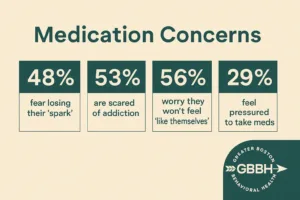When I got my diagnosis, I thought it would bring relief—and it did. For about five minutes.
Then came the fear. Not of the condition itself, but of what treatment might mean. Specifically, medication.
Would it change me? Would it flatten me? Would it take away my creativity, my spark, my ability to feel deeply?
I’d spent years struggling silently. I finally had a name for what I was experiencing. But when someone mentioned starting meds, all I felt was panic. Not because I didn’t want help, but because I didn’t want to lose myself in the process.
That’s why saying yes to a Partial Hospitalization Program changed everything. Not overnight. Not in a movie-moment way. But in real, slow, human ways that let me move forward without being pushed.
If you’re newly diagnosed and scared about medication—or anything that comes after hearing “Here’s what you have”—this is for you.
Diagnosis Was a Beginning, Not a Fix
For years, I blamed myself for being moody, exhausted, overwhelmed, and easily shut down. I thought I just wasn’t trying hard enough. Or that everyone else was secretly struggling too and just better at hiding it.
When a clinician finally said, “You’re not lazy—you’re dealing with a mood disorder,” I felt seen. And for a moment, I felt hopeful.
But then the conversation shifted toward treatment. Words like “medication management,” “stabilization,” and “side effects” landed hard.
I nodded politely. But inside, I was spiraling. I didn’t want to feel numb. I didn’t want to be a zombie. I didn’t want to trade one kind of pain for another.
I didn’t want to be broken or fixed. I just wanted to understand myself and feel okay again.
I Needed More Than Once-a-Week Therapy
Traditional therapy helped—but it also felt like trying to clean out a flooded basement with a spoon.
I needed more structure, more time, and more context. I needed to ask big questions without waiting seven days for answers.
That’s when my provider mentioned a Partial Hospitalization Program.
I’d never heard of PHP before. I pictured white walls, hospital gowns, and being watched. But what I found at Greater Boston Behavioral Health couldn’t have been more different.
What a Partial Hospitalization Program Actually Looks Like
PHP meant I showed up five days a week for a few hours a day—then went home.
There was no overnight stay. No locked doors. No loss of freedom. It was structured mental health care for people who didn’t need hospitalization but needed more than an hour a week.
Each day included:
- Group therapy that actually felt helpful (not cheesy)
- Psychoeducation that explained what was happening in my brain
- Space to ask medication questions with licensed professionals
- Time to just be around other people going through it too
The people there weren’t “crazy” or “broken.” They were parents, college students, creatives, teachers—just trying to figure out how to live with their diagnoses.
It felt like walking into a space where no one needed me to be okay before I got there.
My Fear of Medication Was About Identity
Here’s what I didn’t know until PHP: being scared of medication doesn’t mean you’re resistant. It often means you care deeply about your identity.
In group, I finally said it out loud:
“I’m afraid that if I take meds and I feel better, it won’t really be me.”
People nodded.
Someone else said, “I’m scared that if I stop spiraling, I won’t be interesting anymore.”
Someone else said, “What if I lose my edge?”
That conversation alone softened something in me. I wasn’t alone in my fear. And I didn’t have to rush to a decision.
My treatment team never pressured me. They gave me facts. They listened. They reminded me that starting didn’t mean I couldn’t stop if something didn’t feel right.
They said things like:
- “Let’s go slow.”
- “You get to choose.”
- “Let’s focus on relief, not erasure.”
Slowly, I Started to Trust the Process
I didn’t wake up one day ready. But each day in PHP made the idea of medication feel less like surrender and more like curiosity.
Eventually, I agreed to try a low dose.
I kept waiting to feel numb. Flat. Disconnected.
But what actually happened was… nothing dramatic. Just a little more ease. A little more clarity. A little more room between the hard thoughts and my reaction to them.
I didn’t become someone else. I just became a little more able to show up as myself.
The Power of Being in a Room With People Who Get It
PHP wasn’t just about therapy—it was about not doing this alone.
There was something sacred about sitting in a room where I didn’t have to pretend I was fine. Where I could say, “I’m scared,” and nobody tried to fix me. They just nodded, because they were scared once too.
I met people who were starting meds. People who stopped. People who found the right fit on the third try. People who didn’t need meds at all—but needed the space to talk about why.
It made my experience feel less like a personal failure and more like part of being human.
PHP Helped Me Say Yes to My Own Life
I still have hard days. Medication didn’t erase my diagnosis. PHP didn’t make everything easy.
But both gave me tools—and time—to make decisions I can stand behind.
Now, I can:
- Say yes to plans without dread
- Sit through discomfort without panic
- Name what I’m feeling, instead of numbing it
- Trust that I’m not broken—just in process
And most importantly, I no longer see help as something that takes things from me. I see it as something that helps me return to myself.
If you’re near Boston—or towns like Dedham or Newton—and you’re scared of what comes next after diagnosis, PHP might be a safe place to figure it out.
Frequently Asked Questions About PHP and Medication Fears
Do I have to start medication if I join a PHP?
No. Medication is one part of treatment, but it’s not mandatory. You’ll have space to explore it, ask questions, and decide what’s right for you.
What if I’ve tried meds before and didn’t like them?
That’s common. PHP can help you explore other options, revisit past experiences, and work with professionals to find a better fit—or a different path.
Will I lose my personality if I take meds?
No. The goal of medication is to help you feel more like yourself, not less. That said, it’s okay to have fears. PHP provides support as you explore what’s best for you.
What’s the difference between PHP and inpatient treatment?
PHP offers intensive care during the day, but you return home at night. It’s designed for people who need more than outpatient therapy but don’t need 24/7 supervision.
Can I attend PHP while working or in school?
Possibly, depending on your schedule. Some clients take temporary leave. Our team will help you navigate logistics and advocate for your needs.
Is PHP only for people with severe mental illness?
No. Many people in PHP are newly diagnosed, anxious, or just looking for more support than weekly therapy provides. It’s a step forward, not a last resort.
You Don’t Have to Be Ready—Just Willing
If you’re scared of medication, scared of what a diagnosis means, or just overwhelmed by the idea of healing—you’re not alone. And you’re not too much.
Call (888) 450-3097 or visit Greater Boston Behavioral Health’s Partial Hospitalization Program in Boston, Massachusetts to learn more. We’ll meet you where you are—with answers, not pressure.


